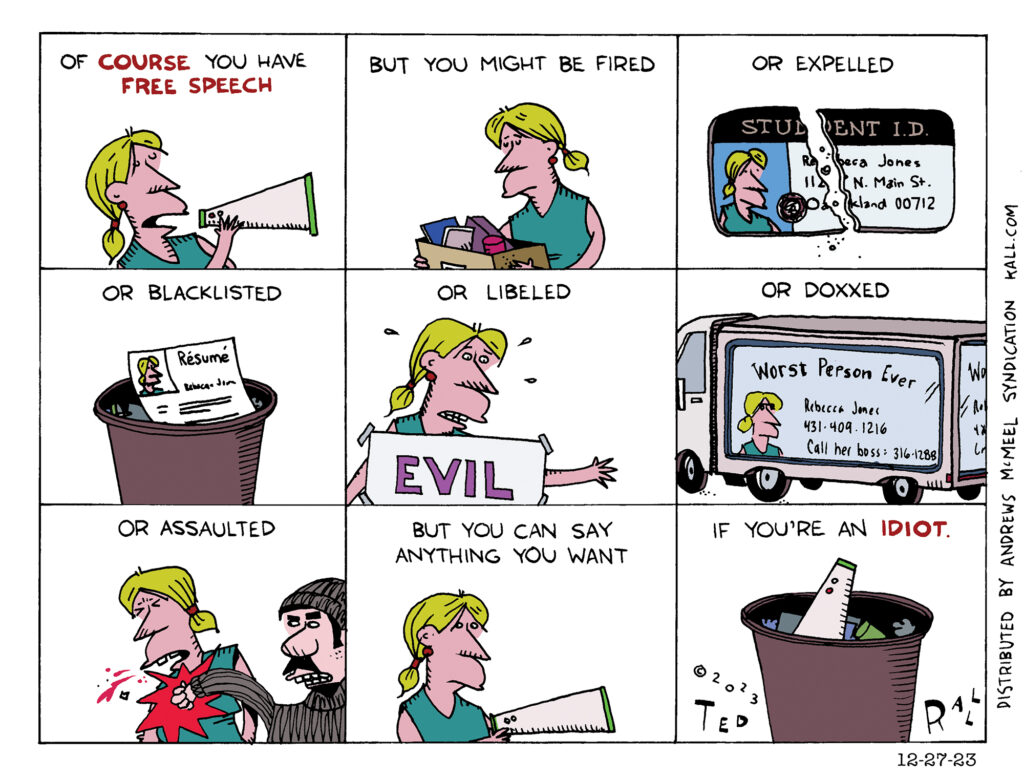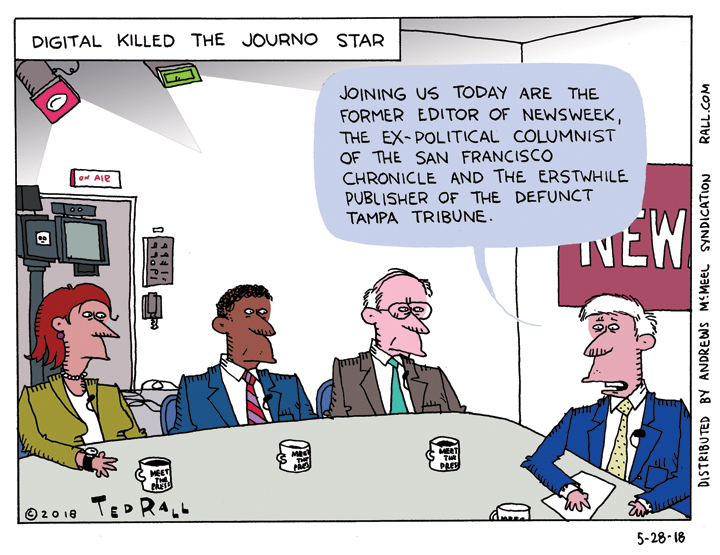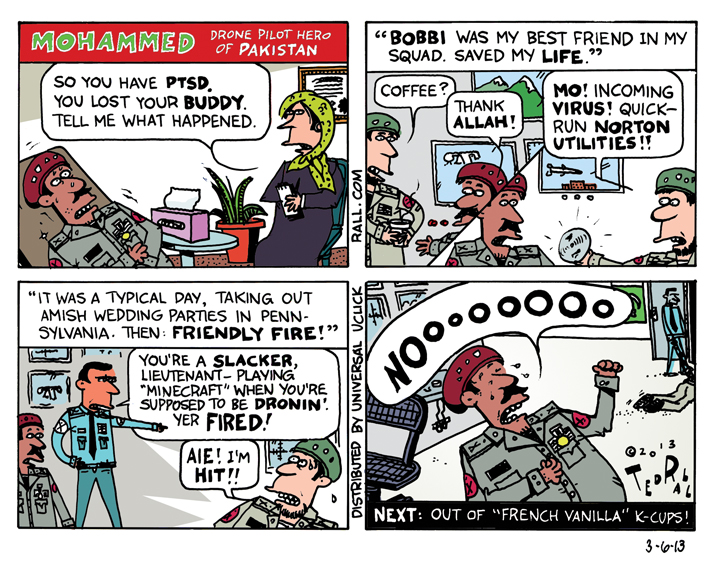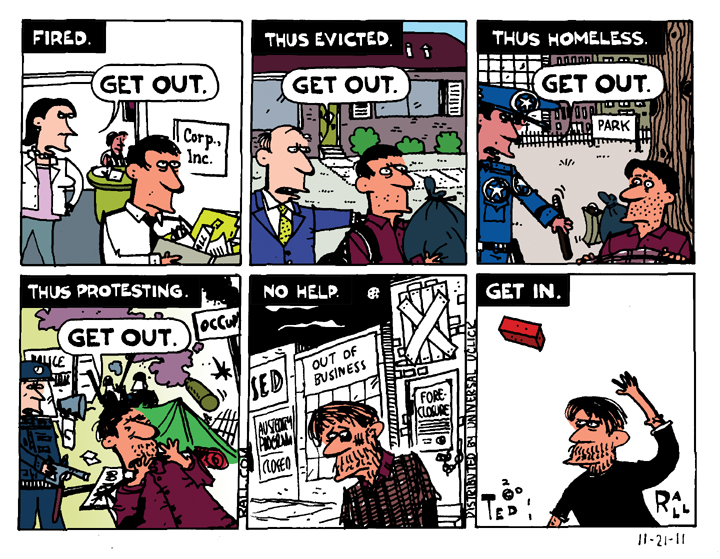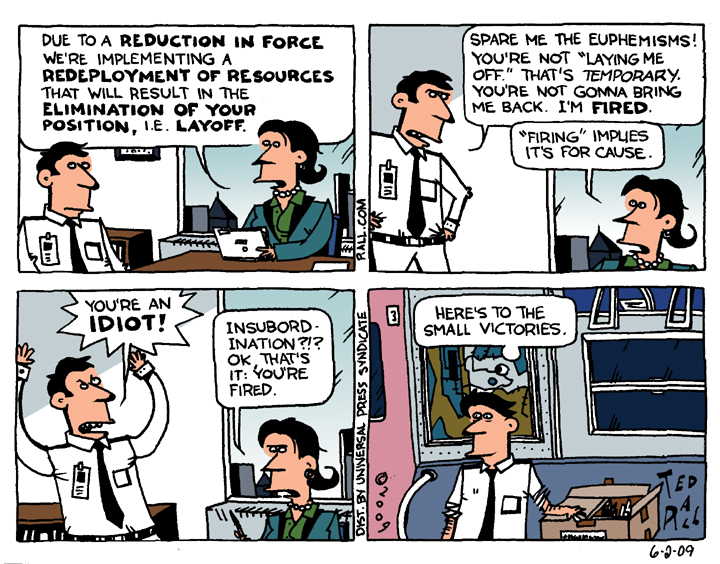Is the right to free speech real in a world in which there are so many disincentives for using it?
OVERVIEW: About my firing by the LA Times as a favor to the LAPD
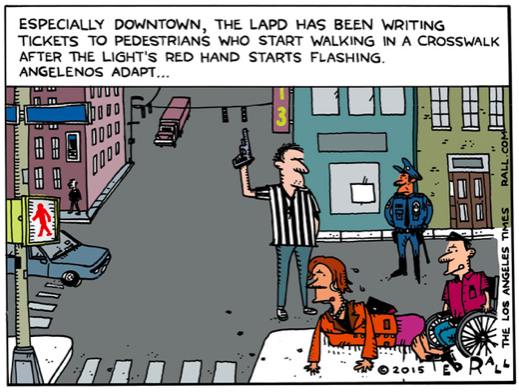 Almost two weeks ago, the LA Times fired me as their editorial cartoonist, where I’d been since 2009.
Almost two weeks ago, the LA Times fired me as their editorial cartoonist, where I’d been since 2009.
Editor Nick Goldberg told me it was because I’d lied in a blog post for the LA Times about how an LAPD cop treated me during a 2001 arrest for jaywalking. They based this on an LAPD audiotape of the arrest. You can read my account of the arrest here.
But when I had the tape analyzed – after Goldberg hastily fired me – it showed that it was the LAPD that is lying, not me. (Goldberg didn’t bother to analyze the tape.) Moreover, the LAPD tape was probably tampered with to try to put the cop in a better light than he’d behaved.
The Times knows they were wrong, yet they’re refusing to reverse their decision, apologize, or retract ” A Note to Readers” that calls me a liar and a fabulist, from latimes.com. The LAPD police union posted a gloaty sinister blog post threatening other journalists to toe the line lest they be next but perhaps they’re feeling the heat, so it’s down now.
Here’s an overview of the sordid affair.
- Start with this Timeline of Events by ANewDomain.net, where most of the breaking news has been and will continue to be released as it comes out. It contains links to most aND’s coverage. (Skip down to the boldface article below if you’re in a hurry and just want to listen to the audiotape.)
- LISTEN to the full, professionally produced audio enhancement. Click here if you’re in a hurry and to read a detailed transcript that reveals an angry crowd and proof that my blog for the LA Times was accurate. If you’re still having trouble hearing it, and/or have time to wait for a large download, here is the higher-quality WAV file.
Here is my initial response to my firing, before I had the LAPD tape enhanced.
The LA Times told me the LAPD told me the arresting officer never used cuffs, ever. But he did – in the pages of the LA Times: “A Discrepancy In The Cop’s Story” by Ted Rall (aNewDomain commentary)
Listen to the Tapes:
Listen to a rough version of the audio enhancement where you can hear an angry woman shouting “Take off his handcuffs!”
Media Coverage (in reverse chronological order):
(* = good places to start)
Cartoonist fired by LA Times after LAPD arrest says evidence ‘spliced and edited’ (by Steven W. Thrasher, The Guardian)
Project Censored: “A remarkable case of censorship” (Project Censored/Pacifica Radio – 1 hour radio interview)
Los Angeles Times Defends Firing Ted Rall, Editorial Cartoonist And Fierce LAPD Critic (by Brendan James, International Business Times)
* Rall’s Deal: Controversial cartoonist Ted Rall fights for his professional life after being fired by the LA Times (by Kevin Ulrich, Pasadena Weekly)
Was Ted Rall Wrongfully Fired From LA Times? (Video) (Huffington Post Live)
* Fired Los Angeles Times cartoonist hits back at newspaper for siding with LAPD (by Sam Thielman, The Guardian)
Ted Rall’s Fight With The LAPD Happens To You (by Ken Womble, Mimesis Law)
Ted Rall Matters (Rob Rogers blog)
US Cartoonist Ted Rall Versus the LA Times (Cartoon Movement, Netherlands)
* Cartoonists call for review of tape used as evidence to cut ties with Ted Rall (Poynter.org)
American Association of Editorial Cartoonists Calls for Independent Investigation into LAPD Tape Used to Fire Rall (Daily Cartoonist)
The Strange Case of the LA Times Cartoonist Fired for Being Too-Critical of LA Police (Orange Beach Rag)
Did The LAPD Have A Political Cartoonist Fired? by Ryan Steadman and Guelda Voien (The New York Observer)
‘Cleaned-Up’ Audiotape of Political Cartoonist’s Clash With LAPD Bolsters His Story by Hunter Harris (news story, New York Observer)
In Defense of Ted Rall, A Hard Guy To Defend by Ken Kurson (editorial, New York Observer)
The LA Times fired a journalist after cops told them he lied—but did they investigate? by Rob Beschizza (Boing Boing)
Cops Gun Down Unarmed Journalist’s Career by investigative reporter Greg Palast (Reader Supported News)
Why Won’t The L.A. Times Admit They Were Wrong About Cartoonist Ted Rall? by Susie Madrak (Crooks and Liars)
LA Times Fires, Publicly Shames Editorial Cartoonist Ted Rall (Mike Lynch Cartoons blog)
Reporting by me and others at aNewDomain.net:
LA Times Responds to Charges That It Fired Me as A Favor to LAPD by Ted Rall
Why The Ted Rall LA Times Scandal Matters So Much (legal analysis by Tom Ewing, aNewDomain.net)
Rall Vindicated, LAPD And LA Times under Fire by Tom Ewing and Gina Smith, aNewDomain.net
The LAPPL applauds L.A. Times firing of cartoonist Ted Rall (LA Police Union Blog gloating, and threatening other journalists)
14 Years Ago, A Woman Vindicated Me Now by Ted Rall (Common Dreams)
Editor: LA Times “Cannot Comment” On Ted Rall. Why? By Gina Smith (aNewDomain)
Finally, here’s how you can help.
Brother, Can you Spare a Dime? How to be Unemployed
Originally published at Breaking Modern:
Your phone rings. It’s your boss. “Hey, Ted, can you step into my office now?”
You enter your boss’ office. The first thing you notice is the lady from human resources is also with your boss. He says, “Have a seat, Ted.”
Then informs you you’re out of work.
Here comes that hollow stomach feeling.
What do you do now?
The first thing to do is to understand that you are not alone. They say the economy is recovering, and by many measures it is, yet 300,000 Americans still lose their jobs every year. If this is the first time for you, congratulations! With the old “work at the same company your whole life and retire with a gold watch” days dead and gone, the boom-and-bust cycle, coupled with the economic disruptions created by mobilization and new technology, jobs coming and going throughout your life is the new normal. If this is the second or third or fourth time, sorry – but it doesn’t make you a bad person. It isn’t personal. It’s capitalism.
The second thing to do is to not do something:
Don’t Get Angry.
You may be tempted to call your soon-to-be former supervisor bad names. You might want to cry. Trashing the office might seem like a satisfying way to go. Don’t. This particular form of temporary satisfaction comes at an unacceptably high price.
Why did you work there in the first place? Survival. You have bills to pay. Now that you have gotten fired/laid off/downsized/rightsized/whatever they’re calling it nowadays, survival is about to get tougher. Maybe your boss was an asshole, maybe it wasn’t your fault, who knows? You might even have a genuine lawsuit to file down the road. But that’s not the first, second or third thing you need to take care of.
Save your revenge for later. Right now, you have work to do.
That’s right: being unemployed is a full-time job.
Make a Graceful Exit.
This is an age of instant communications and social networks. Flame out as you head out the door with your banker’s box full of office supplies, and word will get out – most worriedly, to future potential employers who work in the same field. Assume a stoic demeanor. Take your dismissal with dignity, say goodbye to your co-workers, and be sure to leave your personal email and other contact information with those you’d like to be in touch with in the future.
Give Yourself Time to Adjust.
One of the best pieces of advice anyone gave me the last time I got laid off was: “Give yourself some time to process what has happened.” What that means in practical terms is, don’t go home and start sending out resumes right away.
You’ve just gone through the wringer; getting fired, especially in a country like the United States where your societal status is closely tied to your work, and which has a ridiculously thin safety net, is one of the most-stressful setbacks you will experience in your life. Allow yourself to pass through the four stages of grief: shock, denial, anger, acceptance.
If you feel like going out and getting drunk, do it. Wallow, rage, call your friends and chew their ears off about how evil your boss was. Vent.
But don’t make it a lifestyle. You have bills to pay, remember? The mourning process deserves at least a week, but no more than two.
File for Unemployment.
If you’re eligible – in other words, you were working a regular job, one that issues you a W-2 form, as opposed to a 1099 for freelance work – you probably qualify for state unemployment benefits.
Filing for unemployment is one of the first things you should do when you get home. Like: on day one.
Don’t feel guilty about filing for unemployment. It’s not welfare. You paid into your state’s unemployment system; all you’re doing is taking your money back out now that you need help. Depending on where you live, your salary at your previous job, and how long you worked there, your maximum unemployment benefits range from $240 to $674 per week. Considering the fact that the average duration of a job hunt is about 10 weeks, you’re going to need every penny to get by. Since we are talking about government bureaucracy, it probably will take several weeks before you start to see any money. So file quickly.
The old days of standing in line at the unemployment office are over. It’s easy to file online; simply Google the name of your state and the phrase “file for unemployment benefits.”
Answer the questions truthfully, but bear in mind that every question can and will be used against you as an excuse to deny paying you. So if you aren’t sure whether or not you’re going to receive severance, it’s better to answer the question “Will you receive severance?” with a no.
A few important quirks to bear in mind about unemployment benefits:
They don’t last forever.
If you earn money while looking for a new job, you have to deduct the earnings from that gig from your benefits. In other words, if you are getting $430 a week from the state, and you pick up $200 in freelance work that week, you have to report it, and the state will only pay you $230 that week.
However, you can mitigate this effect. Let’s say you receive two checks, each for $500. You could deposit them both the same week, report that income toward that one week, and the state will only withhold one $430 payment, in the example above.
While on unemployment, you will be expected to be looking for a new job. Most states require that you file at least three applications per week. But it’s not as hard as you think: sending an email to a prospective employer qualifies. Just keep track of the name and contact information for the companies; they will ask you for them later.
Some states will also require you to attend a “job training” seminar. Basically this will involve teaching you how to prepare a resume and cover letter and how to search job sites. Most people will find this kind of silly and useless, not to mention a distraction from actually looking for a job, but conservative politicians have managed to make this a legal requirement for receiving unemployment benefits. This will take place at an office at your nearest county seat.
Thanks to President Ronald Reagan, unemployment benefits are taxable. So remember that at the end of the year Uncle Sam will come looking for his piece of those “huge” payments you’ve been living high on.
If you were fired “for cause,” you won’t qualify for unemployment. Basically, “cause” means they let you go for a legitimate reason other than a general economic downturn or simply not meeting your position anymore, something like theft, incompetence, absenteeism, disobedience, etc.
If you really did something wrong, suck it up and learn a lesson and don’t do it anymore at your next job. But some employers fire good, honest workers “for cause” because it’s cheaper: they don’t have to pay severance and, in some states, unemployment subsidies.
That happened to me in California: I took a vacation day, came back to work and got fired, allegedly for not asking for the day off. Fortunately, I had printed out both my request email as well as my supervisor’s response message authorizing the vacation day. I applied for unemployment, the state opened an investigation, I faxed them the two emails, and they ruled in my favor in less than a week.
If you don’t deserve it, don’t let your former employer screw you. File for unemployment and make sure you present a clear, easy-to-follow case that explains why you didn’t deserve to be fired.
Maybe Do COBRA.
Federal law gives you the right to keep your existing company health insurance for up to 18 months. But your employer no longer subsidizes it. You pay for it in its entirety, which can make it pretty expensive, even if it’s at the corporate rate. I recommend you sign up for it for a month or two, and then apply for Obamacare either via the federal Affordable Care Act website or the one for your state. If you are still unemployed in a couple of months, you may qualify for Medicaid or highly subsidized health care that is a lot cheaper than COBRA.
Of course, if you are a “young invincible” millennial without any major health concerns, you might choose to go without health insurance until you find a new job. Obviously not a great idea – you never know when a meteor might crash through your ceiling – but if you go that route, make sure you stay healthy.
Tell Everyone.
The second thing you should do after filing for unemployment is to let everyone you know – friends, family members, neighbors, everyone you meet – that you’re looking for work, any work, while you struggle to get back on your feet. Even if that last part about taking any work isn’t 100% true – you’re probably not really going to get involved in asbestos mitigation or fishing for Alaskan king crab – it broadcasts both your desperation and your character. People want to help you, but showing that you are open to branching out outside of your comfort zone and aren’t too proud gives them a solid inducement to do so.
Since networking is by far the most effective way to land a new job, getting the word out that you are available, and keeping the word out by repeatedly checking in with your personal and business contacts both by email and by phone, has the best chance by far of paying off.
Negotiate Severance.
If you got laid off as part of corporate downsizing, there is a strong chance that your former employer will offer you a severance payment. In bigger companies the amount will be tied to the length of your service; in smaller ones it will basically be as little as they think they can pay you to get you to shut up.
About the shutting up part: severance payments usually go with a so-called “separation agreement” that the company will ask you to sign. Among the highlights will likely be passages in which you agree not to smear your former employer in a public venue like the Internet (a “non-disparagement clause”), promise not to share company secrets (a “nondisclosure clause”), and possibly a “noncompete” section in which you agree not to go to work for your former company’s competitors.
It will be tempting, given how broke you are about to become, to take the money and run – in other words, sign the separation agreement without attempting to negotiate. If the agreement is relatively benign, that may be okay, but read it over carefully, and if you don’t understand it have a lawyer take a look at it. Separation agreements are often legal minefields that take advantage of people who have just been fired and are still in shock.
When I got laid off from United Media, a subsidiary of Scripps Howard, they demanded that I agree to all the standard sections I described above, plus something outrageous: that I agree to never work in print or online media again. For the rest of my life. I wanted the $5,700 severance, but to never work again in my chosen field, $5.7 million wouldn’t have been enough. Scripps refused to give an inch or change a word, so I ended up leaving without getting a penny of severance. (They claimed they would never have enforced it, but if that were true, why ask for it?) Going without severance made my layoff harder, but looking back now, I’m happy I didn’t sign.
Like any legal document, you’ll have to live with the ramifications of a separation agreement for years to come. Be careful. Give your former employer what they need, like the nondisclosure and non-disparagement sections, but draw the line there. Remember: HR wants to close the file on you just as much as you want that last check.
Can You Sue? Probably Not.
It comes as a surprise to most American workers to learn that, unlike employees in most other Western countries, they are “at will” workers – in other words, their employers can fire them at any time, without notice, for no reason.
There are two exceptions to this:
If you have an employment contract that specifically states possible causes for termination, and they want to let you go for some other reason, you have legal standing to challenge your firing. But most American employment contracts specifically state that you are an at-will employee.
If you can prove that your firing is the result of discrimination due to your age (for being too old, not too young), race, gender, religion, disability, or sexual orientation, you can sue your ex-employer for back wages, reinstatement and punitive damages. Some discrimination laws depend on the state where you were working; others are federal. However, you have to reach a very high bar to prove workplace discrimination and, thanks to recent U.S. Supreme Court decisions, that bar has been raised even higher. Among other things, you will have to obtain testimony from within the company, as well as documents, that confirm a systemic pattern of, say, sexism, to which you fell prey. That is almost impossibly hard.
Launching a successful discrimination lawsuit requires either deep pockets or a lawyer willing to work on a contingency, as it will likely take many years to see your day in court, which even if you win, will be followed by countless appeals. And even if you ultimately prevail, the odds are that you will not walk away with millions of dollars, but perhaps only a nominal sum, or enough to pay your attorney’s fees.
In short, you might be able to sue, but you probably don’t want to. (An exception would be in order to make a political stand against discrimination that would protect workers from being similarly abused in the future.)
Furthermore, suing a former employer all but guarantees that you will never again find work in the same profession. Once the word gets out that you are litigious, no one will want to hire you lest you turn around and sue them too someday. So unless you are one of those 1% of 1% of 1% for whom suing is a righteous cause in and of itself, hide those revenge fantasies of soaking your evil former boss for billions of dollars away in the dark recesses of the back of your brain.
Job Hunt Smart.
You’ve read those stories about people who have been unemployed for a long time: “I sent out 5,000 resumes and never heard back from any of them.” Job sites like Indeed, Monster and LinkedIn are useful, and people do find work from them, but you are literally five to six times more likely to get a job through direct contact than by replying to a job listing.
Direct contact means exactly that: reaching out to an employer where you’d like to work, and where you’d be a good fit, regardless of whether or not they have advertised for a position. Email the big boss – yes, the president or CEO or top manager – with a cc to human resources if they have such a department just to show that you are willing to work through the system – with a two- to three-paragraph email explaining who you are, why you want to work for them, and what you can do for them. Personalize it as much as possible but don’t go crazy; you’re not going to hear back from most of them so it’s not worth spending hours on each email. The shotgun approach will work as long as it isn’t painfully obvious to your prospects.
Don’t spend all day burning yourself out sending out emails. It’s very easy to get depressed while you’re not working, and depression clouds your mind and makes it more difficult for you to brainstorm about what to do next. I recommend getting out of the house in order to clear your mind, heading down to Starbucks or your local café with your laptop, and spending from 9a.m. to 12 noon every day, Monday through Friday, with a view toward just sending out resumes and cover letters to people and places for whom you’d like to work. Don’t bring your dog with you, don’t take any phone calls, don’t chitchat with anyone else there, just work. If the café is too distracting, head to the local library.
Then kick off and enjoy the extra free time. (Some of which should include staying in good physical condition, since being in good shape will keep you mentally healthy and make you more appealing to potential employers.)
Work While You Don’t Work.
Try to scare up some freelance work while you are looking for something permanent and full time. As with unemployment benefits, every penny you have coming in will stave off financial ruin.
Think outside the box. Consider renting out that extra bedroom on Airbnb. If you live in a city or a resort community, the income could be substantial.
What you should not do, however, is to take a poorly paid full-time job – at least not until all your other prospects have been exhausted and your unemployment benefits are gone. The reason is simple: if you are working 40 hours a week at $10 an hour, when will you have time or energy to look for a job that pays $30 an hour?
Budget Cut Smart.
You’ll find it easier to find additional income than to cut your budget to solvency. After all, you can’t cut your budget to zero.
In other words, focus on the job hunt, not on cutting expenses.
That said, we all have expenses that we can cut back upon. If you have premium cable, you might be able to live with basic cable instead or cut the cord and rely on video streaming. But don’t cut back anything that could impede your job hunt, like high-speed Internet service. You’re going to need that. Same thing with the phone. Any communications lifelines have to be paid up on time.
A successful job hunt relies upon persistence, ingenuity and open-mindedness. Even if you don’t have great luck at first, keep looking and eventually you will find something.
Consider ways you can apply your existing skills that may not have previously occurred to you. For example, you might want to look into fields that you wouldn’t otherwise have considered. And be open to the world: Talk to everyone, ask questions, think about opportunities and jobs no matter what they are and where they come from.

